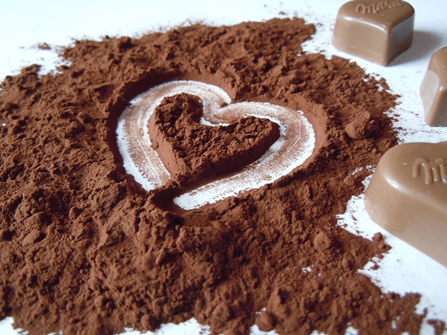
6. Chocolates show cardiovascular biomarker improvements |

![]() To the tantalizing delight of chocolate lovers everywhere, a number of recent studies employing various methods have suggested that compounds in cocoa called flavanols could benefit cardiovascular health. Now a systematic review and meta-analysis of 19 randomized controlled trials (RCTs) of cocoa consumption reveals some further pieces of supporting evidence.
To the tantalizing delight of chocolate lovers everywhere, a number of recent studies employing various methods have suggested that compounds in cocoa called flavanols could benefit cardiovascular health. Now a systematic review and meta-analysis of 19 randomized controlled trials (RCTs) of cocoa consumption reveals some further pieces of supporting evidence.
The meta-analysis in the Journal of Nutrition, an assessment of the combined evidence from all 19 RCTs, focused on whether consumption of flavanol-rich cocoa products was associated with improvements in specific circulating biomarkers of cardio metabolic health as compared to consuming placebos with negligible cocoa flavanol content. In all, 1,139 volunteers were involved in these trials.
![]() "Our meta-analysis of RCTs characterizes how cocoa flavanols affect cardiometabolic biomarkers, providing guidance in designing large, definitive prevention trials against diabetes and cardiovascular disease in future work," said corresponding author Dr. Simin Liu, professor and director of the Center for Global Cardiometabolic Health at Brown University who worked with epidemiology graduate student and lead author Xiaochen Lin. "We found that cocoa flavanol intake may reduce dyslipidemia (elevated triglycerides), insulin resistance and systemic inflammation, which are all major subclinical risk factors for cardiometabolic diseases."
"Our meta-analysis of RCTs characterizes how cocoa flavanols affect cardiometabolic biomarkers, providing guidance in designing large, definitive prevention trials against diabetes and cardiovascular disease in future work," said corresponding author Dr. Simin Liu, professor and director of the Center for Global Cardiometabolic Health at Brown University who worked with epidemiology graduate student and lead author Xiaochen Lin. "We found that cocoa flavanol intake may reduce dyslipidemia (elevated triglycerides), insulin resistance and systemic inflammation, which are all major subclinical risk factors for cardiometabolic diseases."
![]() The study found potential beneficial effects of flavanol-rich cocoa on cardio metabolic health. There were small-to-modest but statistically significant improvements among those who ate flavanol-rich cocoa product vs. those who did not.
The study found potential beneficial effects of flavanol-rich cocoa on cardio metabolic health. There were small-to-modest but statistically significant improvements among those who ate flavanol-rich cocoa product vs. those who did not.
For trial volunteers who ate between 200 and 600 milligrams of flavanols a day (based on their cocoa consumption), significant declines in blood glucose and insulin, as well as another indicator of insulin resistance called HOMA-IR were observed. They also saw an increase in HDL, or "good," cholesterol. Those consuming higher doses saw some of the insulin resistance benefits and a drop in triglycerides, but not a significant increase in HDL. Those with lower doses of flavanols only saw a significant HDL benefit.
For enquiries info@jothydev.net.
Please visit: jothydev.net | research.jothydev.com | diabscreenkerala.net | jothydev.com/newsletter
